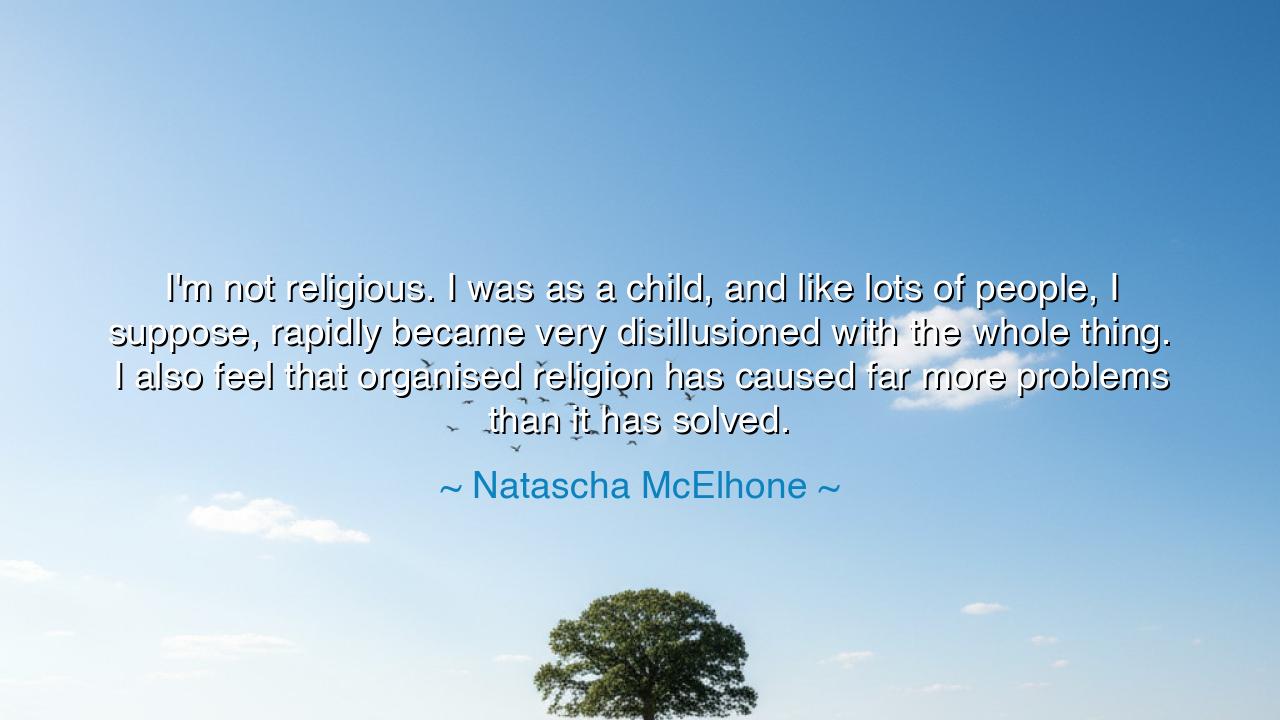
I'm not religious. I was as a child, and like lots of people, I
I'm not religious. I was as a child, and like lots of people, I suppose, rapidly became very disillusioned with the whole thing. I also feel that organised religion has caused far more problems than it has solved.






In the course of human history, religion has both uplifted and divided, healed and hurt, guided and oppressed. The words of Natascha McElhone speak to a personal and universal truth: "I'm not religious. I was as a child, and like lots of people, I suppose, rapidly became very disillusioned with the whole thing. I also feel that organised religion has caused far more problems than it has solved." Here, McElhone speaks not only of her own journey with faith but also of the larger disillusionment that many individuals experience with organised religion as an institution. Her statement highlights the conflict between the pure spiritual longing for connection with the divine and the corruption and failures that often arise when faith is institutionalized.
In the ancient world, there were countless instances where the religious practices of the time, though rooted in deep spiritual truths, were manipulated for power and control. The priesthoods of Egypt, Mesopotamia, and later, Rome, used their religious authority not only to guide people spiritually but to maintain their political power. Plato in his writings often warned about the dangers of those who would use religion for self-interest. In The Republic, he explored the role of philosophy and reason in guiding individuals toward the highest good, rather than superstition or blind adherence to dogma. In the eyes of philosophers like Plato and Socrates, religion should be an individual pursuit of truth, not something to be manipulated by those in positions of authority.
As history unfolded, these concerns about the manipulation of religion were echoed by reformers who sought to return to a more personal and authentic experience of the divine. In the Christian tradition, Martin Luther famously nailed his 95 Theses to the door of the church, protesting against the corruption of the church and the sale of indulgences. Luther’s desire to return to the spiritual core of Christianity, free from the political machinations of the Church, mirrors McElhone’s own desire to distance herself from what she saw as the distrust and disillusionment caused by organised religion. Like Luther, McElhone’s words reflect a yearning for a more personal and authentic connection to the divine, untainted by the human flaws and politics that often cloud faith.
The struggles of religion as an institution, however, are not confined to Christianity alone. Across cultures and faiths, history is marked by the ways in which religious institutions have been used as tools of oppression and control. The Inquisition in the Christian world, the crusades, and the Islamic conquests all show the ways in which organised religion has been used to justify violence and subjugation. These events serve as stark reminders of the dangers that arise when faith is co-opted by political and material forces. For McElhone, the disillusionment with organised religion likely arises from this reality: that throughout history, religion has been used not as a force for peace and understanding, but as a mechanism for division, control, and war.
Yet, despite these dark chapters in religious history, it is important to acknowledge that faith in its purest form remains a force for good in many people’s lives. Mother Teresa lived out her faith by dedicating her life to serving the poorest of the poor, not out of obligation to an institution, but out of a deep love for humanity. Her life was a testimony to the idea that faith, when practiced personally and with humility, can be a powerful force for good. Similarly, Mahatma Gandhi, though deeply involved in Hinduism, used his faith as a foundation for his non-violent resistance against British colonial rule, showing that faith could be a force of liberation and justice rather than violence. These examples demonstrate that religion in its truest form, untarnished by institutional corruption, can lead to profound humanitarian action and transformation.
McElhone’s words, however, remind us of the painful reality that organised religion often fails to live up to its highest ideals. The lesson to take from her statement is not that we should abandon faith altogether, but that we must seek a more authentic connection with the divine, one that is not dependent on external institutions. Spirituality should not be dictated by dogma but be a personal journey—one that leads us to truth, compassion, and peace. We must ask ourselves: How do we define our own relationship with the divine? Do we seek truth through the lens of institutions, or do we cultivate a direct, personal experience of the sacred?
The practical action we must take is to cultivate our own inner spirituality—to engage in self-reflection, meditation, and study in a way that resonates with our own hearts and minds. Religion, when it is genuine and free from the influence of political or material power, can still be a source of strength and comfort. However, it is essential that we detach our spirituality from institutionalized structures that seek to impose their will upon us. Let us be vigilant in choosing a spiritual path that reflects our true values, guiding us toward peace, compassion, and understanding in a world that is all too often defined by conflict and division. Only through this personal commitment to authenticity can we begin to truly experience the peace and love that all the great spiritual traditions promise.






AAdministratorAdministrator
Welcome, honored guests. Please leave a comment, we will respond soon